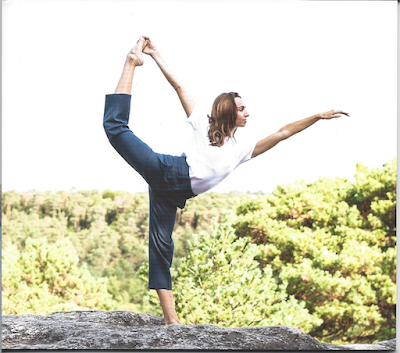 |
| The cover of the liner notes booklet with Lea Desandre showing a bit more flexibility than most classical singers |
Speaking of singers, I see that Adele's planned Las Vegas residency has collapsed in a welter of recriminations and emotional sob-fests. So it is refreshing to turn to a very different singer, the young Lea Desandre who is so new on the scene that her Wikipedia page consists of one line of text! Here is a longer article on her from Opéra magazine, but in French. We don't learn her age from that article, just that she studied dance when she was young before switching to voice.
There seems to be a whole new generation of French musicians coming on the scene. Apart from Lea Desandre, they include the superb harpsichordist Jean Rondeau that I have mentioned a lot here, plus the equally superb lutenist Thomas Dunford whom I have also mentioned several times. I just received yesterday Lea Desandre's new CD Amazone, which also features those other two artists as well as the more seasoned performers Cecilia Bartoli, Véronique Gens and William Christie. The album is released by Erato and I observe that I haven't purchased a disc from them for quite some time.
The theme of the album is in the title Amazone and fifteen out of the twenty-five tracks are world premiere recordings serving notice that we are still far from having exhausted the enormous fund of music from the pre-Bach eras.
I rather grew up with the "early music movement" as it used to be called: people like harpsichordist Gustav Leonhardt and conductor Nikolaus Harnoncourt were influential figures in my musical development. Oddly, their thoughts on music I took as being as profound and insightful as the compositional innovations of people like Steve Reich. Essays by Harnoncourt and Reich both occupied space on my bookshelf. So I do not see it as anything strange that one aspect of a creative musical revival should take the form of a recording of 17th and 18th century music. In a note contained in the album Lea Desandre describes the project as "a hymn to the women who have guided me ... a hymn to Mother Nature ... the poetic, universal and timeless message of a sentimental and emotional journey."
The Amazons were, of course, the mythical race of women warriors and the producers were delighted to discover a substantial repertoire from the 17th to the 19th centuries with Amazon characters and themes. Thomas Dunford's ensemble Jupiter specializes in the Baroque so this disc contains music from the second half of the 17th century and the first quarter of the 18th century.
Now to the music. The CD contains a rich selection of arias and duets from Amazon themed operas by French, Italian and one German composer. More than one opera is named after Mitilene the notional first queen of the Amazons (Marthésie in French). There are also a few sinfonias from operas for the instrumental ensemble as well as a duet with Thomas Dunford and William Christie (theorbo and harpsichord) and an improvisation and a solo by Jean Rondeau (harpsichord), L'Amazône from the 10th Ordre of François Couperin, of course.
Lea Desandre is well up to the challenge of this music. She has the clarity and agility to negotiate the very speedy and complex ornamented passages in the more warlike arias as well as the brilliance of tone in the upper register. I was surprised at how rich and dark her low register could be. A young singer, I'm sure she has room to grow as the voice develops. Cecilia Bartoli and Véronique Gens do an excellent job in the duets. The instrumental group (two violins, viola, cello, two double basses, flute and two percussionists with theorbo, organ and harpsichord) are really excellent under the direction of Thomas Dunford.
The production of the album itself is lovely: it comes in a slim cardboard box with a substantial booklet with photos of the artists, liner notes and all the lyrics in German, Italian, French and English.
Given recent cultural events I was amused to read the opening lyrics of the first aria "Non posso far" by Francesco Provenzale (1624 - 1704). In translation they read:
Chosen intentionally?
Excerpts (I suppose we call them "trailers" now) from the album have been up on YouTube for months, so let's listen to one of them. This is the duet with Cecilia Bartoli "Io piango/Io peno" from the opera Mitilene, regina delle amazzoni (1707) by Giuseepe de Bottis (1678 - 1753), so, composed when he was twenty-nine.

2 comments:
I think I have to get that CD...just gorgeous
It really is!
Post a Comment